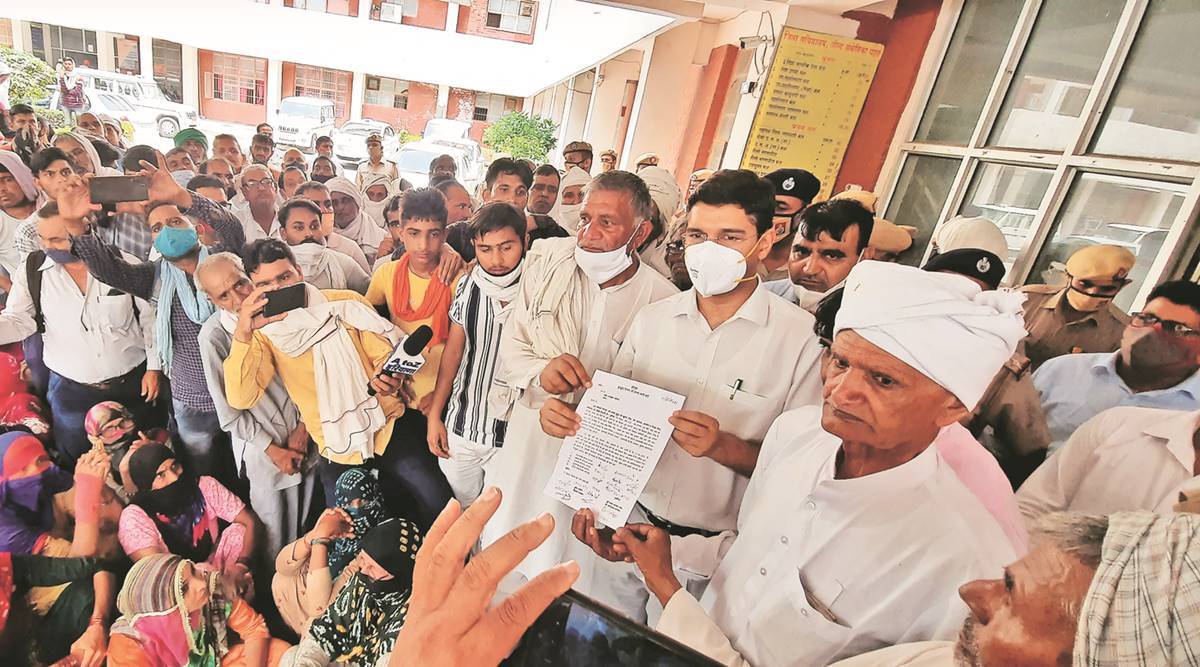After six months of agitation against the three Central farm legislations, protesting farmers are now also starting to slowly focus on local problems plaguing Haryana while continuing their fight against the contentious laws.
From a farmer who allegedly went missing in Delhi on january 26 to a stolen car and from the problems of water needed for irrigation to delay in issuance of tubewell connections — everything is on the radar of the farmers, who have been staging protests and forcing authorities to listen to and act on their grievances.
On June 14, the farmers staged a protest outside Tohana DSP’s office to demand the immediate recovery of a farmer’s stolen car. “As many as 200 farmers gathered outside the DSP’s office in response to a WhatsApp message, despite it being the paddy sowing season,” said Mandeep Nathwan, a farmer leader from Fatehabad.
The farmers claimed that the car was stolen from outside the Sadar Police Station on June 7, when they were staging a protest inside the police station complex demanding release of their fellow comrades arrested in connection with their dispute with JJP MLA Devender Babli. Farmers say they had immediately informed the police about the theft of the car and insisted that the police should have installed nakas to ensure the vehicle’s recovery. However, police officials told them that the entire police force of the area was busy in law-and-order duty on June 7, as hundreds of farmers were camping inside the police station as part of their agitation. When the farmers were staging a protest to demand recovery of the car on June 14, Tohana DSP Birem Singh went to the agitators and said, “We are also sorry that a farmer has lost his car. He is a poor fellow and I believe that the vehicle was not covered under insurance. We will try our best to recover the vehicle. You, too, cooperate with us and tell us if you have suspicion on anybody.”
The farmers, on their part, said they had planned to hold a bigger panchayat at Tohana on June 23, with plans to block the national highway leading to Chandigarh on the same day, if the car was not recovered by the time.
In another case, the farmers of Kandela village planned to block Jind-Chandigarh National Highway if a farmer from their village — Bajinder Singh, 30, who had gone missing after the farmers’ “tractor parade” in Delhi on January 26 — was not traced by June 19. The villagers had taken to the streets on June 11 too on the same issue, prompting Jind deputy commissioner Aditya Dahiya to discuss the matter with the district SP Waseem Akram.
In the third incident, on June 14, a delegation of farmers had approached officers of the irrigation department in Hisar seeking an early resolution to their problems. Farmer leaders say the officials had ensured prompt purchase of wheat in a village of Fatehabad, when they had warned of launching an agitation against what they said were “odd” conditions being imposed by authorities on wheat purchase.
They also said that their ultimatum to launch an agitation against delay in issuance of electricity connections for tubewells has also worked, with the government announcing a timetable to release pending connections.
Farmer leader Mandeep Nathwan said sections of the society these days looked up to the strength of farmers’ unity.
“A few days ago, workers of a government-affiliated body were on a dharna at Ratia and were not being heard by the authorities. The protesters claimed that the work of security and other related things was being given to a private firm, which was offering a salary in the range of just Rs 4,500-Rs 5,000 in place of Rs 13,500-Rs 18,000 as promised. When we intervened, the authorities assured us to provide a contract which would ensure the same salary to the workers which was being offered to them earlier. The authorities there also agreed to release the pending salary of four labourers and improve their working conditions. The workers of the government-affiliated body have now installed flags of the farmer unions there,” claimed Nathwan, who is the convener of Kisan Sanghrash Samiti Haryana.
The farmer leader further added, “Organised farmers were already a strength in the Malwa belt of Punjab, where the farmers have been raising their voice unitedly for a long time. This was not a popular option in most parts of Haryana before the farm agitation started, despite the existence of some farmer unions. Now, the farmer unions are truly evolving. Earlier, the farmers were forced to offer bribes to get even the smallest of works done as sometimes officials took ten days to complete a work that should be completed in ten minutes. Now the farmers feel honoured to visit government offices with badges on their shirts and flags of their unions in their hands. Such is the strength of the agitation that now officers are updating us on a regular basis about the progress in the issuance of tubewell connections.”
BKU leader from Yamunanagar Subhash Gurjar said, “The farmers have come to know about their strength as they have joined hands now. They have now learned how to struggle to get their issues resolved.”
Commenting on the emerging pattern, a history professor at Chandigarh’s Panjab University, M Rajivlochan, said, “This is very a good development. There is a logic behind every agitation. If you allow an agitation to succeed, then the agitation’s leaders often can end up emerging as the lawful leaders of anything and everything.”
“The modern society has to have a monopoly over justice. And if the state is not providing justice to people, the farmers in this particular case, then an alternative system comes up to offer justice. Like if a sugar mill has not provided dues to sugarcane farmers on time, then the farmer leaders go to the sugar mill with an ultimatum that the dues be cleared. Such things have taken place. I have received information about a state, where dues were not cleared for the last ten years but were cleared within 24 hours after an ultimatum was issued by the farm leaders. That is the great success of farmer leaders. They have effectively replaced an incompetent state that has not provided routine or regular services to its people.”
Rajivlochan also recalls a similar style adopted by eminent socialist from Madhya Pradesh, Sunil Gupta better known as Sunil Bhai, who had led several movements in Central India, before he died in 2014. “Sunil Gupta used to opt for a similar pattern in the tribal hamlets of Hoshangabad (MP). He was a successful leader with a completely uncompromising desire to provide justice to those who are poor and weak,” said the noted historian.
However, a senior BJP leader, requesting anonymity, alleged that “all types of elements who are directionless” are behind latest protests in Haryana.




